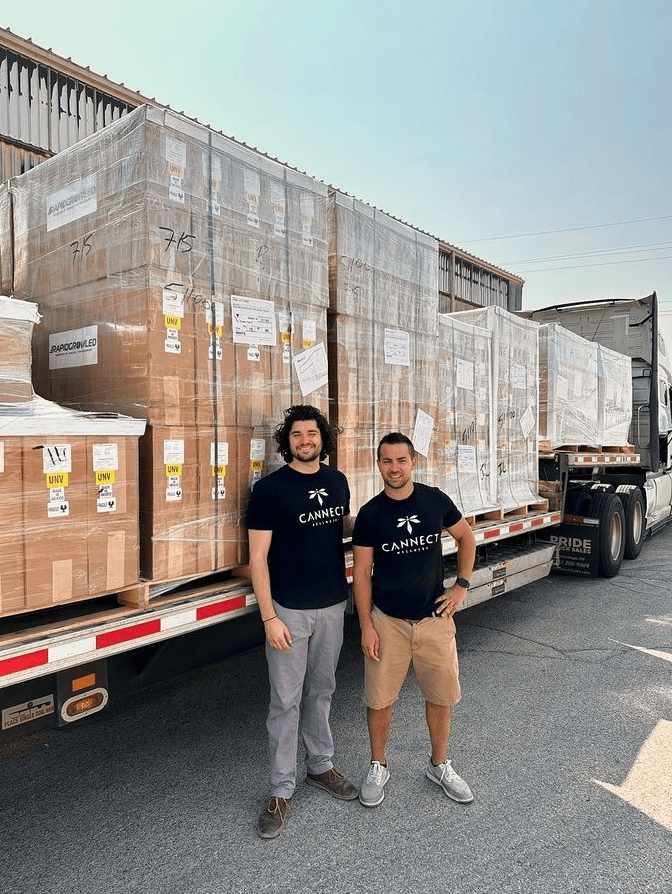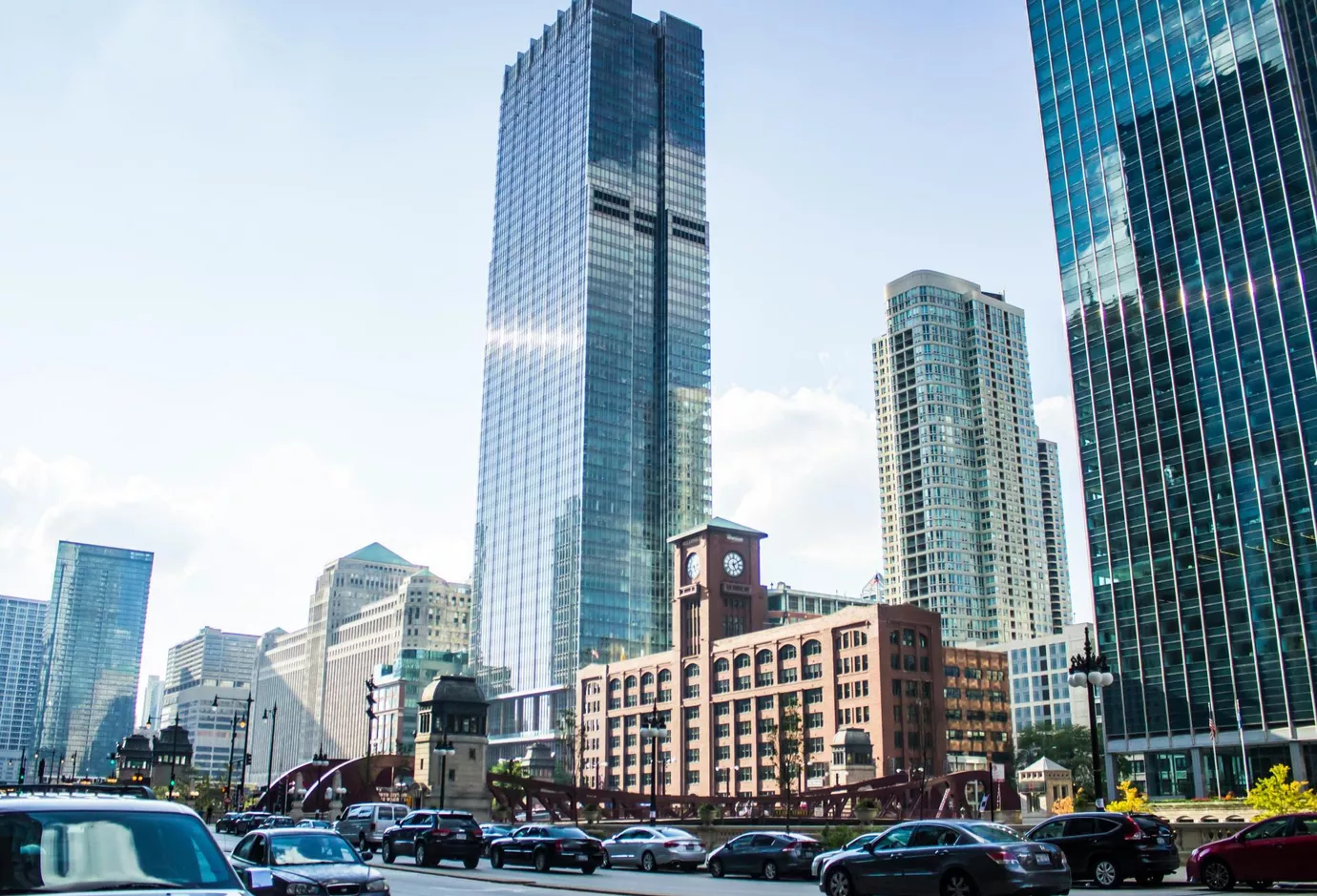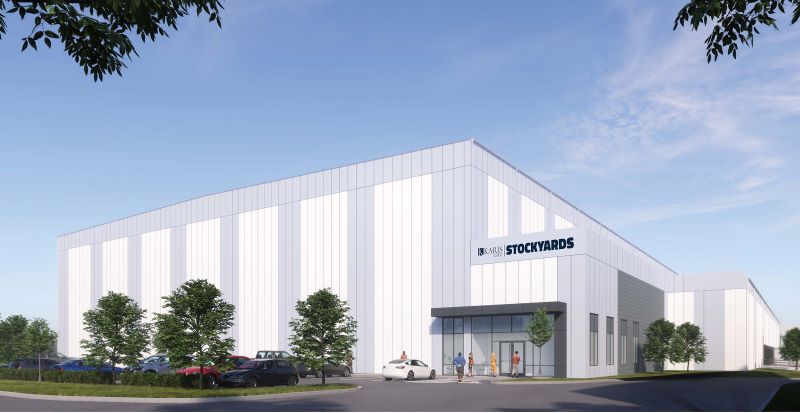July 2023
Finding Space for Cannabis Cultivators

Jake Heller (left), head of cultivation, and David Michaud, chief operating officer, Cannect Wellness.
By: Larry Much | Executive Vice President – Industrial Services, NAI Hiffman
You’ve probably seen the adult-use cannabis dispensaries that have popped up around Illinois since the state legalized recreational marijuana use in January 2020.
Today, Illinois has 113 of them, according to the Illinois Department of Financial and Professional Regulation.
Less visible are craft growers, the small-batch producers of high-quality marijuana akin to craft beer producers. Despite Illinois awarding 88 craft grower licenses, only 16 craft growers have begun construction; and of those 16, only three are operational. Cannect Wellness, which is building out its grow facility in Franklin Park, expects to open its doors this summer and become the fourth craft grower to be operational.
Since about 2014, “cultivation centers,” larger cannabis growers that originally supplied the Illinois medical market, held a monopoly on cannabis production, resulting in limited products available to cannabis consumers. Under federal law, cannabis cannot cross state lines, so every cannabis product that is sold in Illinois is produced in Illinois.
Why so few craft growers? As a commercial real estate professional who helped Cannect navigate the complex application and real estate sourcing process for its grow facility, here is what I have learned.
Challenging application process and startup
Illinois is considered one of the toughest states to get a license for and launch a craft grower business, and it’s expensive: According to the Illinois Independent Craft Growers Association, it costs $5 million to $10 million for a craft grower to enter the market, from application to sales.
When the application windows were open, companies had to pay $5,000 to the state’s Department of Agriculture to submit a competitive, points-based application. Each application required hundreds of pages of written material, including details regarding suitability of location, security, cultivation plans and even plans for community philanthropy.
All craft grower licenses in Illinois were reserved for Social Equity Applicants, a designation used to favor individuals who reside in areas disproportionately impacted by arrests, convictions and incarcerations tied to cannabis. If granted a license by the DOA, a firm must pay $40,000 and be operating within six months.
Craft growers can grow up to 14,000 square feet of “flowering canopy space,” which is the area occupied by marijuana plants in the flowering stage (i.e., their latest stage of growth). But initially, craft growers start with only up to 5,000 square feet of canopy. In Cannect’s facility, plants will be grown inside climate-controlled rooms designed to optimize yield and quality of the product.
While many craft growers struggle to secure a location and then raise money to begin construction, Cannect completed a $7.5 million all-equity raise from investors. Separately, Cannect’s owners, who were represented by NAI Hiffman, purchased the building with traditional bank financing after significant efforts to find cannabis-friendly lenders.
NIMBYism
Not all suburbs welcome craft growers, with many complaints focused on crime and use by minors. However, craft growers are not retail businesses and sell no product directly.
That may alleviate some concerns, but it means they also do not generate sales tax revenue, which can also be a turnoff to municipalities. Under state law, grow facilities cannot be in areas zoned for residential — light industrial is typically required — or within 1,500 feet of another craft grower or cultivation center (larger cannabis growing facilities that support the medical marijuana market). Some suburbs go further; for example, Franklin Park prohibits clusters of producers and shared facilities.
Cannect’s new space is a 62,000-square-foot existing warehouse located west of Mannheim Road near Interstate-294, less than 20 miles from Chicago. The space is essentially being divided into specialized rooms for growing plants and ancillary rooms that support post-harvest production (drying, curing, packaging, waste destruction, etc.).
Each grow room will have LED lights that mimic sunlight, as well as appropriate irrigation, drainage, HVAC and air circulation to optimize growing conditions. This retrofit costs about $350-$450 per square foot.
Under state law, the grow facility must be enclosed and locked, and craft growers need to submit a security plan, including a 24-hour surveillance system, to the Illinois State Police. There also are rules for transportation, HVAC, data collection, packaging, distribution, transport, use of pesticides and more. Properties are regularly inspected by the Department of Agriculture and Illinois State Police.
Slow but steady progress
As Illinois works to make it easier to obtain a license and start up a grow facility, such as by making loans to prospective growers, I think we’ll see more of these businesses. Currently, I’m also helping another cannabis producer — an infuser, which makes products like CBD brownies — find a facility in the northwest suburbs.
While we have not yet realized the full economic benefit of bringing cannabis production to Illinois, we’re well on our way. By working together to clear up the haze surrounding craft growing facilities, we can continue creating a business-friendly cannabis market with a diverse array of products that benefits consumers and pushes state tax revenues to new highs.
About NAI Hiffman:
NAI Hiffman is one of the largest independent commercial real estate services firms in the US, with a primary focus on metropolitan Chicago, and part of the NAI Global network. We provide institutional and private leasing, property management, tenant representation, capital markets, project services, research, and marketing services for owners and occupiers of commercial real estate. To meet our clients’ growing needs outside of our exclusive NAI Hiffman territory, we launched Hiffman National, our dedicated property solutions division, which provides property management, project services, and property accounting services across the country. NAI Hiffman | Hiffman National is an award winning company headquartered in suburban Chicago, with more than 250 employees strategically located throughout North America.
About Hiffman National:
Hiffman National is one of the US’s largest independent commercial real estate property management firms, providing institutional and private clients exceptional customized solutions for property management, project management, property accounting, lease administration, marketing, and research. The firm’s comprehensive property management platform and attentive approach to service contribute to successful life-long relationships and client satisfaction. As a nationally bestowed Top Workplace, and recognized CRE award winner, Hiffman National is headquartered in suburban Chicago, with more than 250 employees nationally and an additional six hub locations and 25 satellite offices across North America.


